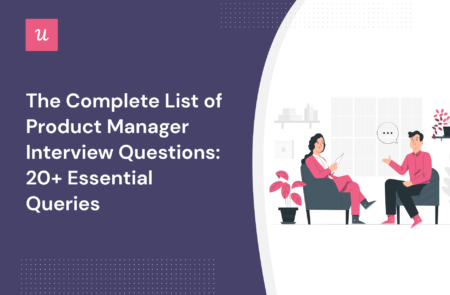
The Complete List of Product Manager Interview Questions: 20+ Essential Queries
Try Userpilot Now
See Why 1,000+ Teams Choose Userpilot

What to look for in product managers?
While this isn’t an exhaustive list, here are seven things to look for in a product manager:
- Problem-solving ability. Because of the fast-paced nature of tech companies, the ability to solve problems quickly and think on your feet is a crucial skill for product managers to have.
- Communication skills. Product managers often work in cross-functional teams and bridge the gap between multiple departments. As such, they need to have superb communication skills.
- Empathy. Product managers need to put themselves in the shoes of company executives, other team members, and of course end users so a strong affinity for empathy will go a long way.
- Leadership. Despite not being classed as a C-level position, product managers are often leading multidisciplinary initiatives that start with your developers and end with the sales team so confident leadership is a must.
- Passion. Prospective product managers need to be incredibly passionate about furthering their careers, impacting the company, and honing technical skills to ensure they don’t burn out when the going gets tough.
- Comfortable with failure. A successful product launch is always the goal but fluctuations in team performance ensure that occasional failures will occur. Product managers need to be able to accept these failures, learn from them, and then move on while ensuring things go better next time.
- Product sense. While there’s no need to grill candidates with overly technical questions at your next product manager interview, favoring applicants with an innate product sense is only logical.
List of questions to ask during product management interviews
Without further ado, let’s look at some product manager interview questions that you can use to find the ideal candidate. There might not always be a clear right or wrong answer, but the responses to these interview questions will usually offer up enough insights to make your final decision.
Behavioral interview questions
The best product manager interview questions to start with are those that center around the behavioral traits of the applicant. This will give you a peek into their mindset, instincts, and management style which will play a key role in their contribution to the company.
Here are the behavioral questions you should ask:
- What do you enjoy most about product management?
- Can you talk to me about how your background has prepared you for this position?
- Can you tell me about a mistake you made and how you handled it?
- What qualities do you look for in a strong product team?
- One executive says that Feature A is more important and another says Feature B is more important. How do you choose which one to implement?
Leadership and communication skills questions
Because cross-department leadership is such a core aspect of product management, dedicating an entire set of questions around leadership and communication is more than worthwhile. The candidate’s answers to these questions will give you a sense of how they plan, prioritize, and coordinate their work.
Here are the leadership and communication interview questions you should ask:
- How do you prioritize tasks?
- How would you manage a team that works across time zones and remotely?
- How do you explain technical concepts to non-technical teams?
- How do you communicate opportunities to the engineering team?
- What is the best way to work with cross-functional teams?
Product management skills and experience questions
Depending on whether the role you’re trying to fill is entry, senior, or executive level the amount of experience applicants will have is bound to vary. That said, probing into any existing product management skills and prior experience is a necessary step that every hiring manager must take.
Here are the product management skills and experience questions you should ask:
- How do you perform customer research?
- What is product vision?
- How to set a product strategy?
- Describe your process to improve a declining metric.
- What software have you used in your previous roles?
- How have you overcome product failures/challenges or poor user feedback?
Product questions
No product is perfect and a big part of a product manager’s job is figuring out what’s wrong and then charting a plan for how to fix it. Figuring out if an applicant is qualified to carry out evaluative research and ensure inclusive design is an absolute must.
Here are the product questions you should ask:
- What changes would you make to our product and why?
- What do you consider when creating product roadmaps?
- How do you decide what and what not to build? Explain your prioritization framework.
- What is the key to a good user interface and inclusive design?
- What changes would you suggest for our main product to better meet the needs of the company’s customers?
Technical knowledge questions
No matter how impressive an applicant’s planning skills and product comprehension are, none of that will matter if they don’t have the technical knowledge needed to execute their proposed strategies. Below are a few examples of technical questions that will verify if they can actually walk the walk.
Here are the technical knowledge questions you should ask:
- Our engineering teams are pretty used to employing X methodologies. What is your opinion of them? Have you used them in the past?
- How would you face a technical challenge you have never encountered before? Describe your methodology step by step.
- When are Bayesian methods more appropriate than “Artificial Intelligence” techniques for predictive analytics?
- What are your favored tools to manage X process (workflow, people management, wireframing)? Why?
What answers to look for to measure product manager candidates’ product sense
Just hearing how applicants explain product management will offer up plenty of insight into how well they understand the field and whether or not they’re the right candidate for the position. The language they use will also tell you how in tune they are with the target market which is crucial for language/market fit.

Prioritizing features
When candidates are asked about how they prioritize which features to release first, they should always answer both with their preferred approach and a detailed explanation of the specific benefits that led them to that preference.
If their answer is vague or unclear, ask them to give you one or two examples of how this specific approach has worked for them in the past. You should also consider how adaptable their prioritization framework is and whether or not it’s flexible enough to account for unexpected speed bumps.
Feature success
Hearing how an applicant measures new feature success will quickly tell you if they’re on the same page when it comes to which aspects of the customer experience are most important. Pay attention to how they gauge the impact a feature has and which metrics they use to inform their conclusions.
If a new feature fails to gain traction at launch, ask them how they’d diagnose the problem and increase feature usage moving forward. Remember, most competent product managers will try using UI patterns to drive feature discovery but great product managers will rely on user feedback to identify the root issue.
Product iterations
The willingness to collect customer feedback on a regular basis and then iterate based on those insights is a cornerstone of product management. Whether it’s usability testing, customer interviews, or more advanced customer feedback collection methods it’s important to keep iterating.
Ask candidates to tell you about a successful project that resulted from user-centric iteration and what impact that had on the overarching product KPIs. Any applicant that mentions the importance of segmentation during iterative testing deserves bonus points.
How to use product manager interview questions to hire great product managers
Selecting the perfect product management candidate for your company is nothing short of a Herculean task. There are countless nuances to consider — but the difference between a good product manager and a great product manager can be night and day.
Here are a few differences between good and great product managers:
- Good PMs offer consistent results while great PMs constantly improve the trajectory of key performance indicators.
- Good PMs conduct market research while great PMs become industry experts.
- Good PMs look at which product features customers are using, while great PMs help users discover new features.
- Good PMs do what they’re told while great PMs do whatever it takes to make a product successful.
- Good PMs stick to the script while great PMs aren’t afraid to break a hard and fast rule.
- Good PMs talk to all departments while great PMs bridge the gap between senior management and development or marketing teams.
- Good PMs collect quantitative data while great PMs incorporate qualitative data to avoid biased or poor feedback.
- Good PMs learn about a company’s product while a great PM uses all of the company’s products.
- Good PMs conduct user research while great PMs get a hands-on understanding of the product line.
- Good PMs imitate larger companies while great PMs conduct competitive analysis to stay ahead.
- Good PMs try to keep the product roadmap on track while great PMs work to speed things up.
- Good PMs listen to user input while great PMs figure out why customers feel that way.
- Good PMs use software to reduce their workload while great PMs use machine learning to get more done in less time.
As you can see, hiring an experienced product manager who is truly great at what they do is paramount. This is especially true when a major challenge comes their way that requires an effective solution to keep the product roadmap on track.
How to identify great product managers
The only way to separate the good from the great before hiring them is to ask questions that shine a light on their approach to product management. Here are a few questions that you can ask to figure out which applicant is a senior product manager in the making:
- How do you measure your impact on a product or company?
- How do you learn about the industry and target audience of a product?
- How do you determine which features alleviate key pain points?
- How would you overcome internal factors to ensure cross-department communication?
- How do you familiarize yourself with the product you’re managing?
- Do you prefer qualitative or quantitative feedback?
Best ways to answer any product manager interview question
A common question that you might get in product manager interviews is “How many windows are in New York City?” This might seem completely irrelevant but what the product management team is trying to determine is whether or not the applicant is capable of guesstimation.
There are two ways to answer this question:
- Calculative. Consider the variables like the population of New York City and how many windows each person is most likely to have.
- Preparatory. Conduct research before the interview to find out that there are nearly 13 million residential windows in New York City and a total of 15 million if you include business windows.
The first approach is the type of response this question was designed for. However, showing up armed with a definitive answer to the question can show the recruiter that you’ll be a data-driven product manager should you land the role.
Which stage certain questions show up will also vary from company to company. For instance, Google breaks the PM hiring process down into three stages:
- Recruiter call. A brief call to gauge an applicant’s motivations, personality, experience, and capacity for communication.
- Phone interview. A 50-minute call with one of Google’s product managers to measure a candidate’s product sense.
- On-site interviews. Five separate 50-minute interviews with a 10-minute Q&A at the end of each round.
Best answer examples to common product manager interview questions
Below are sample answers to common questions you might get as a product management applicant!
Product pricing sample answer
Q: How would you explain our product to a potential customer interested in a similar solution that costs $20 less? How would you explain our product to someone interested in something similar, only $20 cheaper?
A: “Our solution may cost $20 more but the additional features you’ll get easily generate $60 worth of additional value each month.”
Product launch sample answer
Q: What strategies do you use to ensure a successful product launch?
A: “I structure a product launch based on the input I get from the product development and marketing leads to ensure the roadmap coincides with key deliverables. I utilize weekly meetings to ensure everyone is still on schedule to meet their team’s respective milestones.”
Product design sample answer
Q: Define a well-designed product.
A: “A product should be ready to use out of the box and intuitively designed. It should also use language, colors, and elements that are aligned with the target customer’s use case.”
What to avoid saying during product manager interviews
There are also a few things you should avoid saying during your interview such as:
- “I’m really nervous.”
- “What does the company do?”
- “It’s all on my resume.”
- “Perfectionism is my greatest weakness.”
- “I don’t have any questions for you.”
In addition, never speak negatively about your previous employer.
Tip: Minimize your usage of “um” and “like” or, ideally, eliminate them entirely.
Conclusion
As you can see, asking the right product manager interview questions will bring you one step closer to finding the ideal candidate to fill the role. If you use the questions outlined in this guide, apply our interview tips, and listen to every answer then you’ll have better odds of making the right hiring decision.
If you’re ready to equip your product managers with the best adoption and growth platform on the market, then it’s time to get your free Userpilot demo today!






